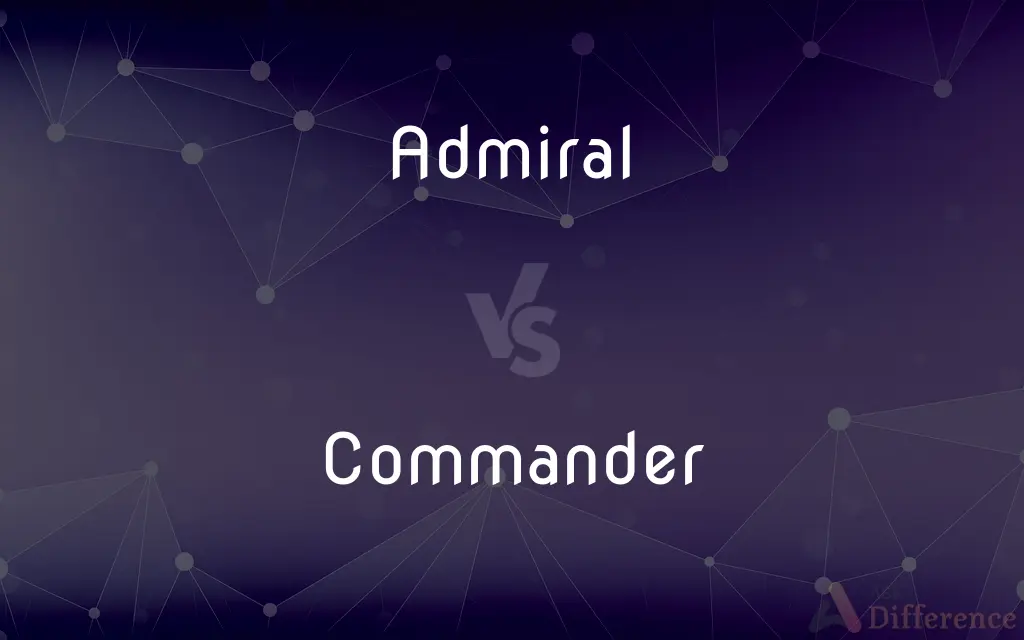Admiral vs. Commander — What's the Difference?
By Maham Liaqat & Fiza Rafique — Updated on April 3, 2024
An Admiral commands multiple ships or a fleet within a navy, holding a higher rank and broader responsibilities, whereas a Commander typically leads a single ship, submarine, or navy unit, focusing on tactical operations and personnel management.

Difference Between Admiral and Commander
Table of Contents
ADVERTISEMENT
Key Differences
Admirals and Commanders play pivotal roles within naval hierarchies, each holding distinct ranks and responsibilities that contribute to the operational efficiency and strategic success of naval missions. Conversely, a Commander, ranking below an Admiral, directly oversees the daily operations, personnel management, and tactical decisions of a single ship, submarine, or specific naval unit, ensuring readiness and effectiveness in executing missions.
The path to becoming an Admiral involves extensive experience, leadership acumen, and a proven record of service within the navy. This rank is achieved after years of progression through naval ranks, demonstrating strategic insight and the ability to command at the highest levels. A Commander, while also requiring years of service and leadership capability, is a rank attained earlier in a naval officer's career, focusing on honing tactical leadership and operational management skills essential for commanding a naval unit.
The scope of authority and decision-making power distinguishes Admirals from Commanders. Admirals participate in high-level strategic planning, policy formulation, and command decisions that shape naval operations and national defense strategies. In contrast, Commanders exercise authority within the confines of their specific command, making tactical decisions that align with broader strategic objectives set by higher-ranking officers, including Admirals.
Admirals and Commanders engage differently with military and civilian leadership structures. Admirals often serve as key advisors to top military officials and government leaders, providing insights and recommendations on naval strategy and defense policies. Commanders, while primarily focused on their unit's operations, may interact with higher command and occasionally civilian authorities, primarily to coordinate mission objectives and report on unit readiness and operational outcomes.
Despite their differences, both Admirals and Commanders are integral to the success of naval missions, embodying leadership, dedication, and strategic vision. Their roles, though distinct in scope and authority, are complementary, ensuring that naval forces remain prepared, agile, and capable of addressing challenges and threats in diverse maritime environments.
ADVERTISEMENT
Comparison Chart
Rank
Higher, commands fleets or multiple ships
Lower, commands a single ship, submarine, or unit
Responsibilities
Broad, overseeing strategic operations and planning
Focused, managing daily operations and tactical decisions
Experience
Extensive, with years of service and progression through ranks
Significant, but typically less than an Admiral
Authority
Strategic decision-making and policy formulation
Tactical leadership within specific command
Engagement
Advises top military and government leaders
Coordinates with higher command and reports on unit operations
Compare with Definitions
Admiral
Extensive experience required.
Reaching the rank of Admiral requires years of dedicated service and demonstrated leadership.
Commander
Tactical operations leadership.
Commanders make critical tactical decisions to fulfill mission objectives and manage personnel.
Admiral
Advisor to military and government.
Admirals often advise top government and military officials on naval strategy and policy.
Commander
Operational reporting.
Commanders report on their unit's operations, readiness, and challenges to higher command.
Admiral
High-ranking naval officer.
The Admiral, overseeing multiple ships and operations, plays a crucial role in strategic naval planning.
Commander
Focused command responsibility.
A Commander's responsibilities are centered on the efficient operation of their specific command.
Admiral
Strategic oversight.
Admirals are responsible for formulating strategies that shape naval missions and national defense.
Commander
Naval officer in command.
The Commander directly oversees the operations of a ship or naval unit, ensuring its readiness.
Admiral
Broad command authority.
An Admiral has the authority to make wide-ranging decisions affecting the navy's operational capacity.
Commander
Career progression.
Attaining the rank of Commander is a significant milestone in a naval officer's career, marking leadership capability.
Admiral
Admiral is one of the highest ranks in some navies. In the Commonwealth nations and the United States, a "full" admiral is equivalent to a "full" general in the army, and is above vice admiral and below admiral of the fleet, or fleet admiral.
Commander
Commander is a common naval officer rank. Commander is also used as a rank or title in other formal organizations, including several police forces.
Admiral
The most senior commander of a fleet or navy.
Commander
A person who commands, especially a commanding officer.
Admiral
A butterfly which has dark wings with bold red or white markings.
Commander
A commissioned rank in the US Navy or Coast Guard that is above lieutenant commander and below captain.
Admiral
The commander in chief of a fleet.
Commander
One who holds this rank or a similar rank in another military organization.
Admiral
A flag officer.
Commander
The chief commissioned officer of a military unit regardless of rank.
Admiral
A commissioned rank in the US Navy or Coast Guard that is above vice admiral and below Fleet Admiral.
Commander
An officer in some knightly or fraternal orders.
Admiral
One who holds the rank of admiral, Fleet Admiral, rear admiral, or vice admiral.
Commander
One who exercises control and direction of a military or naval organization.
Admiral
Any of various brightly colored nymphalid butterflies of the genera Limenitis and Vanessa, especially V. atalanta, having black wings with red bands.
Commander
A naval officer whose rank is above that of a lieutenant commander and below that of captain.
Admiral
(Archaic) The ship carrying an admiral; flagship.
Commander
One who exercises control and direction over a group of persons.
Admiral
A naval officer of the highest rank; the commander of a country's naval forces.
Commander
A designation or rank in certain non-military organizations such as NASA and various police forces.
Admiral
A naval officer of high rank, immediately below Admiral of the Fleet; the commander of a fleet or squadron.
Commander
(obsolete) The chief officer of a commandry.
Admiral
A flag officer in the United States Navy or Coast Guard of a grade superior to vice admiral and junior to admiral of the fleet (when that grade is used). An admiral is equal in grade or rank to a four-star general.
Commander
A heavy beetle or wooden mallet, used in paving, in sail lofts, etc.
Admiral
The ship which carries the admiral, the flagship; also, the most considerable ship of a fleet.
Commander
A rank within an honorary order: e.g. Commander of the Legion of Honour.
Admiral
(obsolete) A prince or Saracen leader under the Sultan.
Commander
Any of various nymphalid butterflies of the Asian genus Moduza.
Admiral
Any of various nymphalid butterflies of the genera Kaniska, Limenitis and Vanessa, especially a red admiral or white admiral.
Commander
A chief; one who has supreme authority; a leader; the chief officer of an army, or of any division of it.
A leader and commander to the people.
Admiral
A naval officer of the highest rank; a naval officer of high rank, of which there are different grades. The chief gradations in rank are admiral, vice admiral, and rear admiral. The admiral is the commander in chief of a fleet or of fleets.
Commander
An officer who ranks next below a captain, - ranking with a lieutenant colonel in the army.
Admiral
The ship which carries the admiral; also, the most considerable ship of a fleet.
Like some mighty admiral, dark and terrible, bearing down upon his antagonist with all his canvas straining to the wind, and all his thunders roaring from his broadsides.
Commander
The chief officer of a commandery.
Admiral
A handsome butterfly (Pyrameis Atalanta) of Europe and America. The larva feeds on nettles.
Commander
A heavy beetle or wooden mallet, used in paving, in sail lofts, etc.
Admiral
The supreme commander of a fleet; ranks above a vice admiral and below a fleet admiral
Commander
An officer in command of a military unit
Admiral
Any of several brightly colored butterflies
Commander
Someone in an official position of authority who can command or control others
Commander
A commissioned naval officer who ranks above a lieutenant commander and below a captain
Commander
An officer in the airforce
Common Curiosities
How do Admirals and Commanders contribute to national defense?
Both ranks are crucial for national defense, with Admirals shaping strategy and Commanders ensuring operational readiness.
What challenges do Admirals face?
Admirals tackle complex strategic challenges, including defense planning, resource allocation, and inter-agency coordination.
How does a Commander fit into the naval hierarchy?
A Commander leads a single ship, submarine, or naval unit, focusing on tactical operations and personnel management.
How often do Commanders interact with Admirals?
Commanders may interact with Admirals during strategic briefings, operational planning, and when reporting on unit readiness.
What is the role of an Admiral in the navy?
Admirals oversee strategic planning and command multiple ships or fleets, shaping naval operations and policy.
What qualifications are needed to become an Admiral?
Becoming an Admiral requires extensive naval experience, leadership skills, and a record of exceptional service.
How does one become a Commander in the navy?
Officers become Commanders through career progression, demonstrating leadership and operational expertise.
What are the key responsibilities of an Admiral?
Admirals are responsible for high-level strategic planning, operations oversight, and advising military and government leaders.
What makes a successful Commander?
Successful Commanders exhibit strong leadership, tactical acumen, and the ability to manage personnel effectively.
Can a Commander make strategic decisions?
Commanders make tactical decisions within the scope of their command, aligning with broader strategic objectives set by higher ranks.
What is the difference in authority between an Admiral and a Commander?
Admirals have broader authority for strategic decision-making, while Commanders focus on tactical decisions within their command.
How does a Commander support an Admiral’s strategy?
Commanders implement tactical operations and decisions that align with the strategic objectives set by Admirals.
What impact do Admirals have on naval policy?
Admirals significantly influence naval policy, strategy formulation, and defense postures.
Are Admirals involved in day-to-day operations?
Admirals focus on strategic issues and are not typically involved in the day-to-day operations of individual ships or units.
Why is the Commander's role critical in naval operations?
Commanders ensure the readiness, efficiency, and tactical success of their units, playing a vital role in achieving naval objectives.
Share Your Discovery

Previous Comparison
Logistician vs. Logician
Next Comparison
Kasha vs. BarleyAuthor Spotlight
Written by
Maham LiaqatCo-written by
Fiza RafiqueFiza Rafique is a skilled content writer at AskDifference.com, where she meticulously refines and enhances written pieces. Drawing from her vast editorial expertise, Fiza ensures clarity, accuracy, and precision in every article. Passionate about language, she continually seeks to elevate the quality of content for readers worldwide.














































